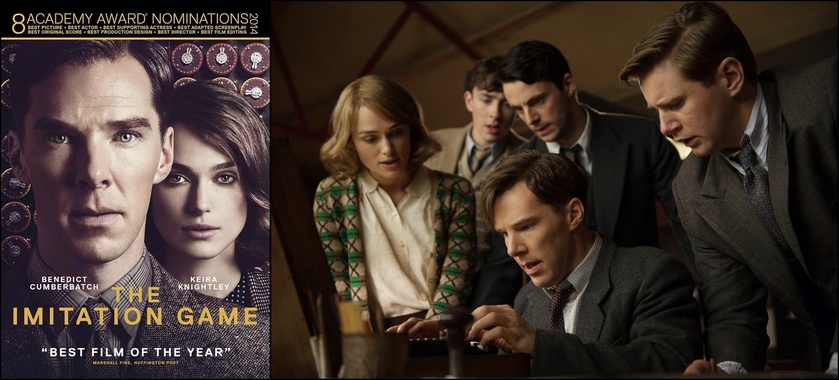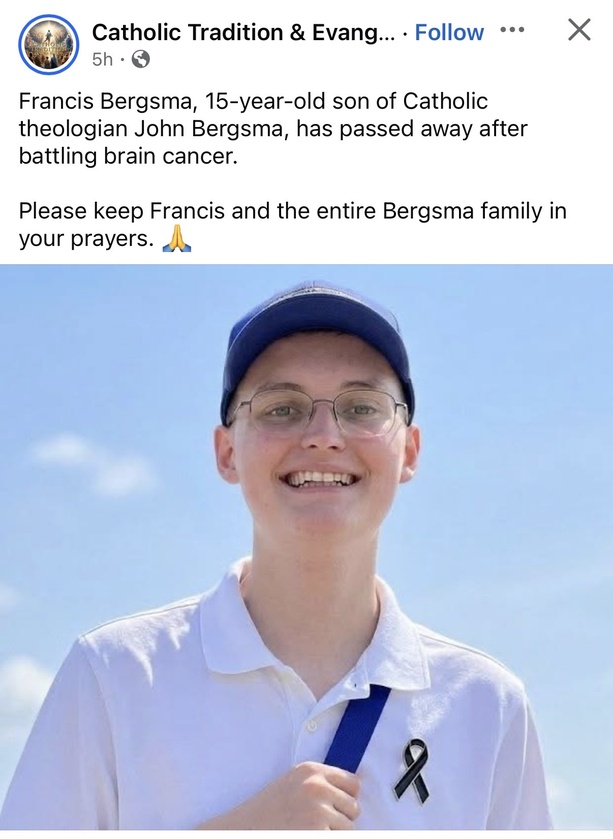Pop-Cultured Catholic #20: A Dilemma in “The Imitation Game” and the Problem of Evil
Now, we are midway into my planned trio of latest posts, involving “Interstellar”, “The Imitation Game”, and “Samurai Jack”.
”The Imitation Game” is a period piece drama and thriller film, based on the story of how Alan Turing and other British cryptographers helped the Allies break Germany’s secret code during World War II. Benedict Cumberbatch portrays the famous computer science pioneer, who works on a device to decode messages broadcasted through the German “Enigma” machine. Besides scrambling a plaintext message into an encoded “ciphertext”, the Enigma machine would be reset daily, requiring the code to be unscrambled all over again. Much of the plot revolves around Cumberbatch’s portrayal of Alan Turing having to build rapport with his fellow cryptographers and discern weaknesses in the German code, so they can figure out how to properly calibrate their prototype machine and decipher it in time. This parallels the real-life Turing‘s success in helping the creation of the British decoding machine called Bombe (the prototype to which is portrayed being named “Christopher” in the movie, after one of Turing’s childhood friends who tragically died at a young age, Christopher Morcom). Additionally, the real-life Turing grew up experiencing same-sex attraction, at a time when such inclinations were not as well understood and homosexual relations were outright criminalized, rather than just being disagreed with. “The Imitation Game” takes some historical liberties to accentuate that aspect of Turing’s life and struggle. One example is the added fictional subplot, where Turing crosses paths with the real-life Soviet spy named John Cairncross, who tries to blackmail him with knowledge of his homosexuality.
My post will focus on one particular scene in the movie, when the cryptographers break one of the Enigma machine’s codes for the first time, and a dilemma quickly emerges. One of the notable weaknesses historically exploited in the Nazi Engima machine was the presence of individual words, which could be predicted to appear consistently in an upcoming message. This would allow a code-breaker to utilize a strategy called the “known-plaintext attack” (KPA), in which a section of the encrypted text translating to an already predicted word can be used to accelerate the process of deciphering the rest of a code. The movie portrays “weather” and “Heil Hitler” as the words utilized in the KPA of Turing’s team. Once the team discovers that their prototype Bombe can decipher the code almost immediately, upon being calibrated with that information in mind, they soon learn of an imminent U-boat attack on a British passenger convoy. The cryptographers get ready to warn the British military of the attack, until Turing realizes something and demands they consider this first: “Hardest time to lie to somebody is when they’re expecting to be lied to”. If it becomes too obvious to the Nazis that the Allies have broken Enigma, then they will halt all communications and overhaul their coding process, sending the Allies back to square one. Turing points out, “Our job is not to save one passenger convoy; it is to win the war”. Personal tensions escalate when one of the team members, Peter Hilton, reveals that he has a brother aboard the very ship, which is soon to be attacked. When I rewatched the scene, I noticed that Hilton even outright states in despair, “You’re not God, Alan”, before continuing, “You don’t get to decide who lives and who dies”. Turing reluctantly maintains his willingness to not immediately act, “Yes, yes we do… Because we’re the only ones who can”.
Granted, there is a chunk of artistic license at play in the film’s dilemma scene, but this liberty does serve an important purpose in the narrative. From what I recall looking up, the cryptographers themselves had no involvement in the decision making which followed, for that was left up to a separate group of officials much higher up in the chain of command. Also, the exposition that one of those decision-makers has a brother aboard a targeted ship was made up for the film. However, this liberty can help audiences better feel the weight of those very real dilemmas, by having them attached to these fictionalized character portrayals, whom the viewer may be more emotionally invested in. Also, this is in keeping with the approaches of many other biopic films, where certain parts of a real-life story are often simplified and/or condensed, so the essence of that story can be more digestibly experienced within a single-sitting runtime.
Shortly after I left the theater screening, I pondered that particular scene further and noticed what it is portraying at its bare basics: Someone in a position of power and knowledge is reluctantly allowing something evil to come to pass, so that a greater good remains more achievable in the long term. While not a perfect analogy, this echoes some of the philosophical discourse surrounding the Problem of Evil. As Saint Thomas Aquinas points out, “if one of two contraries were infinite, the other would be completely destroyed”, and God is known as infinite good. He is also omnipotent, omniscient, and omnipresent. Yet acts of evil are still able to occur, which we can all clearly see around the world. As that scene from “The Imitation Game” illustrates, one may sometimes need to allow an act of evil to occur, in order to help win the bigger war. However, where the immediate similarities end is that British military would be choosing to not act, specifically because of limitations in their own power which God would not have. In order for my analogy to apply to God and the Problem of Evil, there must be a unique other reason for why the most ideal victory is only achievable, if God allows some bad things to happen, despite him being all powerful.
To find the potential right track to an answer, for why even an omnipotent God could face an equivalent dilemma as the one portrayed in “The Imitation Game”, I would like to revisit a quote by fantasy author George R.R. Martin, which I cited in one of my very first “Pop-Cultured Catholic” posts: “The battle between good and evil is a legitimate theme for a Fantasy (or for any work of fiction, for that matter), but in real life that battle is fought chiefly in the individual human heart. Too many contemporary Fantasies take the easy way out by externalizing the struggle, so the heroic protagonists need only smite the evil minions of the dark power to win the day. And you can tell the evil minions, because they're inevitably ugly and they all wear black. I wanted to stand much of that on its head. In real life, the hardest aspect of the battle between good and evil is determining which is which."
While the external battle during WWII is a physical one waged on the open fields, to be primarily settled by whichever side employs the more potent use of strength, God and Satan’s war is ultimately one for men’s hearts, to be settled by people’s free will and inspired virtues/vices. If I were to elaborate here, I would be retreading a lot of the details I already raised in the post I made on George R.R. Martin’s quote, last July 27th. But to give the overall point, the ultimate spiritual war between good and evil is not something which can be most decisively won, merely by a single swoop of external power that smites the evil minions of the dark power to win the day. Therefore, one could make an argument that God’s omnipotence would not necessarily be a factor that instantly ends said war, even if it does help ensure that good will triumph in the end, as a foregone conclusion. And if God still has to wage such a war, in a manner that involves decisions limited by certain constraints, such as keeping mankind’s free will intact and driving people to achieve victories through their own choices and efforts, then perhaps there are times when God faces his own equivalent to those dilemmas raised by “The Imitation Game”.
Though, Christianity does provide a consolation one can uniquely turn to, should they experience evil being allowed to happen to them or someone they love, namely the fact that God himself is willing to take part in our suffering as Jesus Christ. I have always intuited that God’s willingness to take flesh, make himself vulnerable before mankind, then allow himself to experience suffering and death by mankind’s hands makes him easier to trust in amidst our own trials. Unlike the fictionalized portrayal of Alan Turing, who is making these decisions from a position of relative safety and is not directly experiencing the evils he is allowing firsthand, Jesus has directly faced and suffered it himself. So he knows our sufferings better than anyone, and we can at least be consoled that he is with us in the thick of it, giving our tribulations some meaning, enabling us to unite our sufferings with his, and not exactly just abandoning us to them.
For this post’s supplementary materials, I will link back to my post on George R.R. Martin, plus link three clips from “The Imitation Game” which make up the scene I analyzed…
1.) "Pop-Cultured Catholic: George R.R. Martin’s (Perhaps Unintentional) Insight into the Problem of Evil"
https://mattfradd.locals.com/post/5924153/pop-cultured-catholic-george-r-r-martin-s-perhaps-unintentional-insight-into-the-problem-of
2.) "Turing breaks Enigma – The Imitation Game (2014)"
https://www.youtube.com/watch?v=aSqLS8s2B4c
3.) "The Imitation Game (HD CLIP) | Keeping It a Secret"
https://www.youtube.com/watch?v=Qdfp5Za0XVg
4.) "The Imitation Game (2014) - Deciding Who Lives and Who Dies Scene | Movieclips"
https://youtu.be/Tkwh3_zqlac?feature=shared&t=73






























